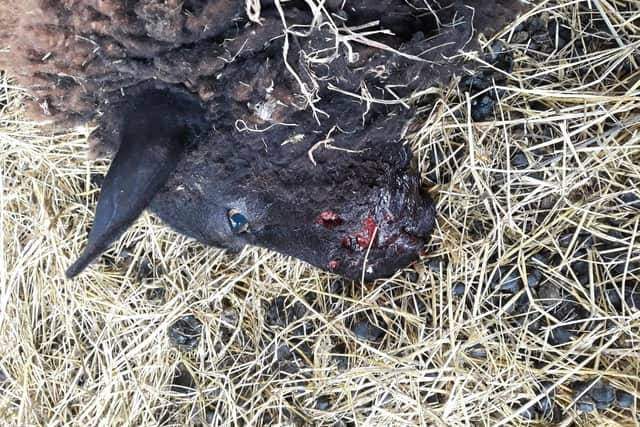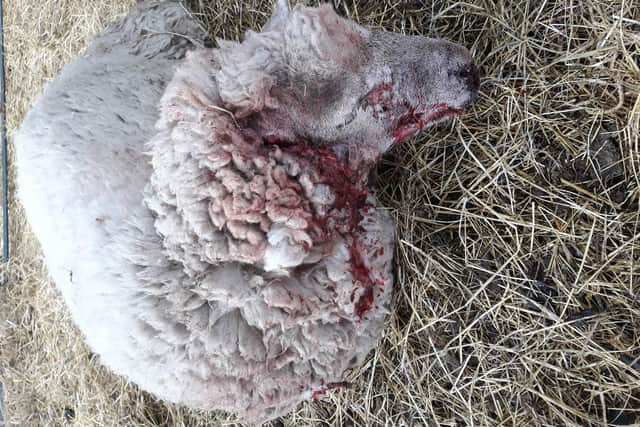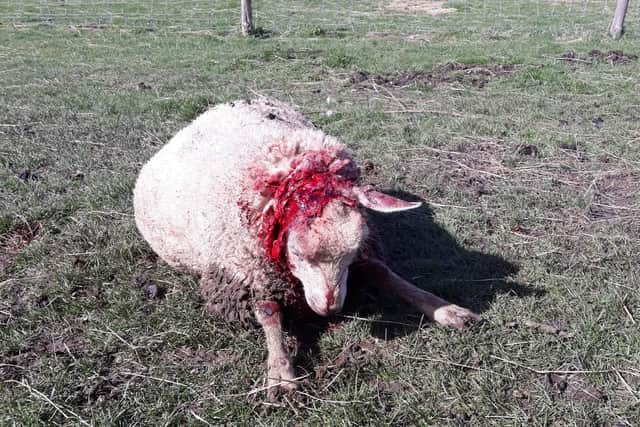Farmers plea after three sheep mauled to death by Staffordshire Bull Terrier: "keep your dogs on a lead"


Helen said that worryingly, this is not the first time her animals have been attacked.
After the first attack she put up images of what the dogs had done to her sheep, and attacks and incidents decreased.
Advertisement
Hide AdAdvertisement
Hide Ad

However, Helen's farm borders on the canal path, where people often let their dogs off their leads and let them roam free.
After this initial hiatus, three of her yearling sheep were savagely attacked again last weekend.
One was bitten so hard through the mouth, that it could no longer eat and had difficulty breathing. The other two had ears torn off and other damage.
All three of them had to be put down.


However police are looking at new laws that mean dog owners could be sent to prison for failing to control their animals.
Advertisement
Hide AdAdvertisement
Hide AdHelen said: "I had 17 sheep in that field, they were yearlings, born last year.
"They were quietly grazing in their fields when a neighbour came frantically to our farm saying there was a dog in the field with them, chasing them and even attacking a couple of them.
"When i got closer I could see the extent of the horrific injuries, and instantly went to persue the woman who was the owner of the dogs."


After a long chase where the dog walker ran away, Helen found her cowering behind a 4X4 in a driveway.
Advertisement
Hide AdAdvertisement
Hide Ad"People don't realise how much trauma this causes my animals. They get really frightened very easily. I went out to check on them this morning and they are still cowering in the corner of the field."
The government is looking at changing the law, creating a DNA dog database to stop attacks on livestock.
Sheep worrying cost farmers £1.2m last year, a huge dent on the farming economy.
But it's feared that number may be much larger, with a recent survey finding only 39% of farmers reported all attack incidents to police
Advertisement
Hide AdAdvertisement
Hide AdThe National Police Chiefs' Council (NPCC) are currently investigating what it would take to develop a DNA database for dogs.
It would allow swabs to be taken from injured or killed sheep and run through the database to potentially match it to a dog's DNA and trace the owner.
Sheep worrying by dogs can carry a prison sentence or fine for the owner.
Detective Chief Constable Craig Naylor, the NPCC's lead for wildlife and rural crime, said: "We have previously explored developing a national DNA database for dogs, to assist police in investigating attacks on livestock.
Advertisement
Hide AdAdvertisement
Hide Ad"We are aware of work done in various laboratories that show the scientific opportunities available to law enforcement and would be keen to pursue this when budgets allow."
But the NPCC says budget constraints mean it is not currently possible to build such a database.
Helen wanted to give the following message to dog walkers in the area, for the sake of her animals.
"Please, please, please keep your dogs under close control. If you just let them run this is going to happen again and again. It's really irresponsible of you as dog owners if they can behave like this to let them off the lead in an area where they can endanger other animals."
Advertisement
Hide AdAdvertisement
Hide AdThe Dogs (Protection of Livestock) Act 1953 says that if a dog worries sheep on agricultural land, the owner and/or the person in charge of the dogs is guilty of a criminal offence: “If a dog worries livestock on any agricultural land, the owner of the dog, and if it is in the charge of a person other than its owner, that person also, shall be guilty of an offence.”
Criminal proceedings can be brought with the consent of the chief officer of police for the area in which the land is situated, but the occupier of the land and/or owner of any of the livestock in question can also bring criminal proceedings without the support of the police.
The Act gives the term ‘worrying’ a wide meaning, including: attacking livestock; chasing livestock in such a way as may reasonably be expected to cause injury or suffering to the livestock (or in the case of females, abortion or loss or reduction of their produce); or being at large (not on a lead or otherwise under close control) in a field containing sheep.